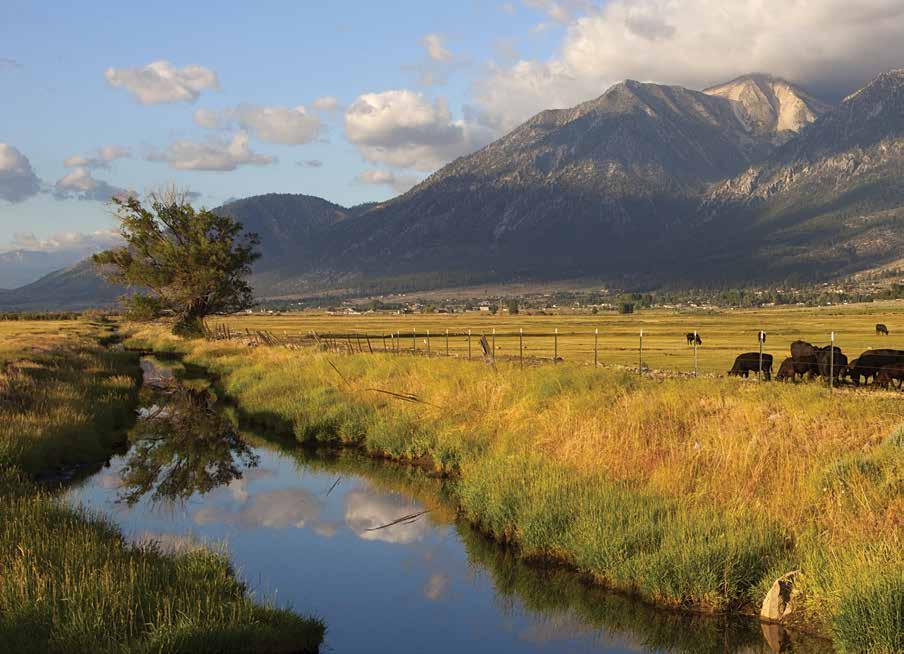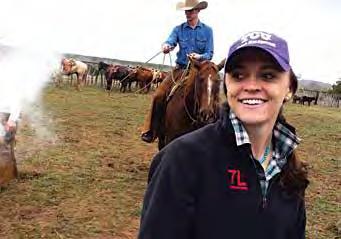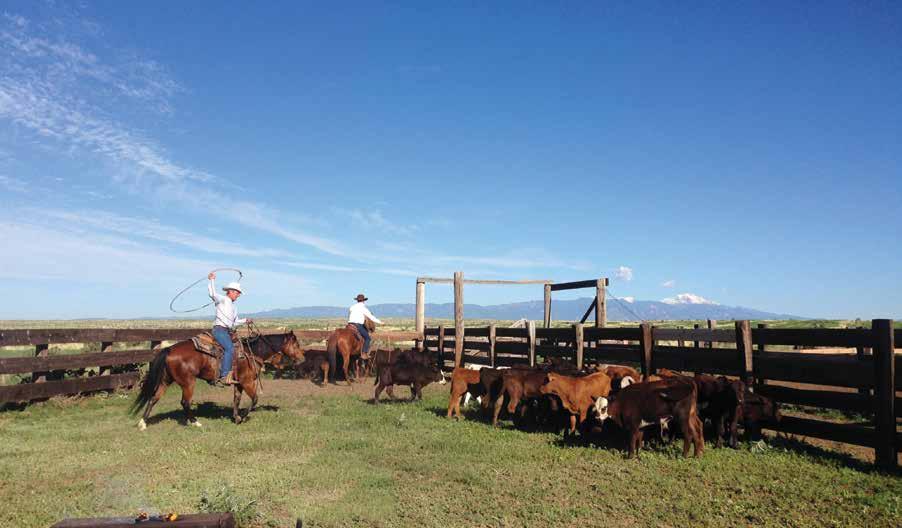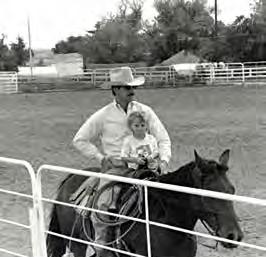
5 minute read
If you eat... you are part of agriculture
by Maggie Hanna ’07

grew up on Hanna Ranch, a small, family-run operation in Hanover, Colo. I grew up checking heifers before the school bus pulled to the end of the driveway. I learned to drive standing on the front seat of the feed truck with the steering wheel tied to the door. I watched the weather change people’s personalities (for better and for worse), and had the good fortune to be raised by some of the hardest working humans I will ever know. I
I grew up in a family who prioritized concepts like engagement, stewardship and conservation. Even beyond
the livestock, these concepts consume us in the way we interact in the community, the ways in which we manage family relationships, and the desire to understand the system at large—from the soil and grass, to water and wildlife—the systems that support our work. I have always appreciated this lifestyle. I thought this is how people grew up. I have long toyed with how to make a place for myself in Colorado agriculture. I

could go home to the Hanna Ranch and carry the torch as the fourth generation; I could work for one of the many industry organizations; I could pursue work in landuse planning, and the list goes on. Last September, after completing the Texas Christian University Ranch Management Program, I was hired on by the Colorado Cattlemen’s Agricultural Land Trust. Not only was I grateful for the job, but I was immensely excited to have found a place


Hanna’s uncle, Jay Frost ’78 and David Leach (married to Tess Phillips Leach ’04) roping at a neighbor’s branding. It is a tradition of cooperation that neighboring ranchers spend a day branding at each other’s ranches.
to carve out my niche and live the dream my own forefathers had dreamed not long ago.
CCALT has worked for 21 years to conserve Colorado’s working agricultural lands and Western heritage. It was the first land trust in the country to be founded by the producers themselves. Today, CCALT ranks sixth in the country in terms of acres conserved with easements on close to 470,000 acres of Colorado ranchland. An easement is a voluntary legal agreement between a landowner and a land trust or government agency that permanently limits use of the land in order to protect its Hanna and her father, Kirk Hanna ’73 on horseback in the early 90s. He was also a graduate of Texas Christian University’s Ranch Management Program.
conservation values. The conservation of open spaces provides innumerable benefits to the general public. These benefits include conserved watersheds, clean air, open and healthy places, and the chance for future generations to live in a Colorado with thriving agriculture.
One of the most profound values of conserving private lands is that they are already under the stewardship of men and women who care deeply about the health of the system. Daniel Webster noted that “when tillage begins, other arts follow. The farmers [and ranchers], therefore, are the founders of human civilization.”
We now live in a society with a huge focus on food, chefs and restaurants. It is too easy to lose sight of the fact that the farmers and ranchers—the growers—are the foundation not only of our culture, but also of our health and wellness. I, myself, can lose sight sometimes.
Along with my position at CCALT, I have become actively engaged in the management of Hanna Ranches, Inc. I work alongside my mom, sister and countless neighbors to manage the operation. We are a relatively small operation that serves the very first link of the meat protein supply chain. We run a commercial cow-calf herd on the shortgrass prairie complemented with irrigated hay production. I am not, nor has any member of the Hanna family, been great with equipment, and I would not include backhoe work on my resume, but we are each committed to learning from and bettering the industry that provides all of our foundations. Though I am a mere fledgling in the world of ranch managers, food producers and land stewards, I am energized every day to know that this is work that will provide food, conserve working agricultural lands, and tie each new generation to our agricultural heritage. Ranching is a profession that will humble me every day and teach me even when I don’t want to learn (most recently these lessons have come in the form of pinched fingers from fence stretchers, unpredictable cattle markets, flat tires and challenging family conversations). We are all part of this system, so I ask that if you plan to eat, breathe clean air and drink clean water, that you engage with the system, learn from the people who steward our open spaces, and value the fact that we still have people willing to live off the land.
On my refrigerator, I have a magnet that reads, “If you eat…you are part of agriculture.” Though this is a system only a few of us have the chance to work in, it is a system all of us have the opportunity to work on. If we eat, we owe it to society to pay attention, to be informed and to be engaged. The production of food and fiber goes far beyond food and fiber. The farmers and ranchers who work day in and day out do it because they have an undeniable commitment to the land and livestock, to maintaining open spaces, and to creating healthy places for communities beyond themselves.
Though my work in both arenas will undoubtedly keep me awake nights, will wake me up early and will stretch me far beyond my comfort zone, I believe in it, because BEEF, it’s what’s for dinner.











